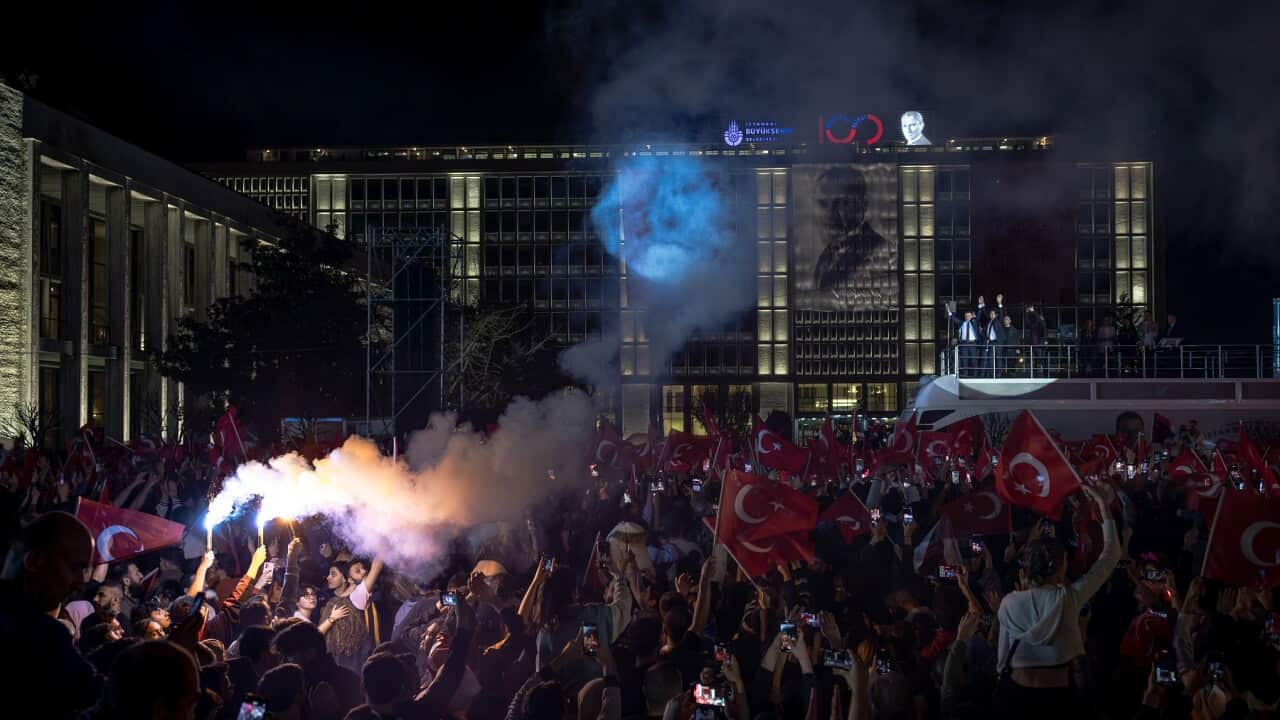TRANSCRIPT
Türkiye woke up to a new political landscape on Monday following elections where the main opposition party retained its control over key cities and made huge gains elsewhere.
It was a major upset to President Recep Tayyip Erdogan, who had aimed to retake control of those urban areas.
Berk Esen is a political analyst and Associate Professor at Sabanci University.
He called the centre-left Republican People’s Party's success in Türkiye's local elections a "phenomenal victory."
“The main opposition party delivered the biggest election defeat of President Erdogan's entire political career. And in fact, they performed so well that they had their best night since the 1977 elections. CHP (Republican People’s Party) surpassed the current ruling party and went on to win 38% of the vote share, picked up several major municipality governments across the country, as well as retaining control of most of the municipal governments in greater, metropolitan areas. It's a phenomenal victory for the main opposition party.”
CHP - the main opposition party - kept hold of Istanbul and the capital Ankara by wide margins but also added wins in conservative provinces.
Mr Esen says that was unexpected.
“It's quite clear that the ruling party's weakened by intra-party factional rifts, mismanagement of the economy, corruption allegations and lack of popular, competent candidates. But at the end of the day, I expected the main opposition party to retain control of the local governments that it currently has, but not necessarily win so many, across the country. In fact, CHP had delivered such a major victory that they went on to win local governments in some of the country's most conservative parts, including places like Kirikale, Adiyaman and Kilis.”
The party won in 35 of Türkiye's 81 provinces – including the country’s five most populous cities – while Mr Erdogan’s Islamic-oriented Justice and Development Party, or AKP, took 24.
Crucially, the CHP took 37.7 per cent of the nationwide vote with nearly all the ballots counted.
The AKP secured 35.5 per cent.
Professor Esen says it was largely due to pro-government voters gradual disappointment over a lack of delivery on promises.
“This is the third election where we saw the turnout rate decline beneath 80%. And I think it was caused by several factors working together, mainly pro-government voters, who were happy with Erdogan's reelection victory, got disappointed by the fact that Erdogan's government did not deliver on most of its promises over the last 10 months. And so they didn't...they wanted to send out this strong message. I think some opposition voters were disillusioned by their parties for their defeat in the last presidential election.”
A delegation of observers from the Council of Europe monitored the elections.
The observation mission was comprised of 26 observers from 16 European countries who observed voting procedures in more than 140 polling stations including in Istanbul and Ankara.
Deputy head of the delegation, Vladimir Prebilic, says the Council of Europe has had long-standing concerns over Türkiye's election practices, many of which remained unaddressed.
“While we welcome the competitive nature of these elections and that voters were able to choose between many alternative options, we can only note that the 2024 local elections in Türkiye took place in a starkly polarized environment and were only partially conductive to local democracy. ... Based on existing electoral standards and our experience as observers in the Council of Europe Member States, some long-standing concerns related to Turkiye remain unaddressed. In addition, recommendations and address to Turkish authorities following the 2019 local elections are still valid.”
Mr Prebilic says more needs to be done.
“In line with the Council of Europe Principles of Democracy, Rule of Law and Human Rights, more needs to be done to ensure a political and media environment where there is a genuine freedom of expression and a reasonable and well-implemented framework overseen by an independent judiciary.”
He says observers received information about public officials being transferred to certain districts to increase the possibility of certain candidates being elected particularly in southeastern Türkiye .
Observers did not get clear answers from Türkiye’s Supreme Election Board in the cases where more than 100 people were registered in one house, adding that the delegation didn't have any concrete information how those incidents affected the outcome.
Ruling party supporters say it was lack of gratitude among the Turkish public that gave the opposition the huge gains they got in the local election.
Fatma Hanedar is a 40 year-old ruling party supporter.
“I was devastated and very upset that the results weren’t in our favour. For 20 years, there was abundance, everything was perfect. We got over a pandemic. There was an earthquake and 11 provinces were destroyed all at once. Wasn’t everything put back together? Who put it back together? The person who governs us did, didn’t he? ... There shouldn’t have been such ungratefulness. If I don’t see it, what services have I seen from the opposition? I know I’m beating a dead horse but I’m going crazy, I can’t accept it.”
Husametin Ezer is another party supporter.
He is 52 years-old.
“We are not happy with Istanbul Mayor Ekrem İmamoğlu. Unfortunately, it turns out people are ungrateful. Unfortunately, I say what a shame. And I have nothing more to say. Thank God, our president is still at the helm. He said he’d go out in the field, do what needs to be done, and has said we’ll work on it.”
After clinching a resounding victory and retaining his post in Sunday's mayoral elections, 53 year-old Istanbul mayor Ekrem İmamoğlu is now a potential future president in the view of many analysts.
Mr Imamoglu says voters sent a message directly to President Erdogan.
The message was that 'those who do not understand the people's wishes will eventually lose'.













